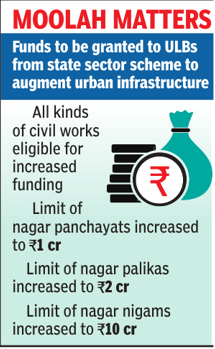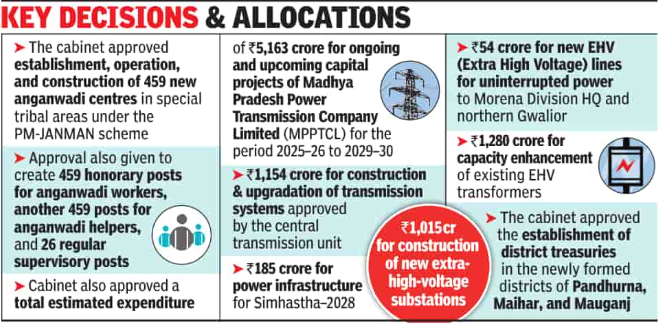Maharashtra Switch to Hindi
Maharashtra Cabinet Approves Agri Al Policy
Why in News?
The Maharashtra Cabinet approved the MahaAgri-AI Policy 2025-29, focusing on transforming the agriculture sector with the integration of AI, robotics, drones, and predictive analytics.
Key Points:
- Innovation and Incubation Centres: The policy will establish innovation and incubation centres at four agricultural universities, guided by prestigious institutions such as the Indian Institutes of Technology (IITs) and the Indian Institute of Science (IISc).
- Funding and Implementation: A fund of Rs 500 crore has been allocated for the first three years of the policy, accompanied by a three-tier administrative structure to ensure efficient execution.
- Global Collaboration and Annual Summit: An independent centre will be established to foster global partnerships, and an annual global summit will be organized to connect with investors, rotating locations across the state.
- Policy Evolution: The policy will be updated every five years to keep pace with rapid advancements in the AI sector.
West Bengal Switch to Hindi
Historian Chittabratan Palit, Pioneer of Agrarian History, Dies
Why in News?
Chittabrata Palit, a renowned expert in the agrarian history of colonial Bengal, as well as in indigenous science, technology, medicine, and American history, passed away in Kolkata on 13 June 2025 at the age of 82.
- He is remembered for his significant contributions to academia, particularly in the areas of Bengal’s rural society and the history of science.
Key Points
- Early Life and Education: He was born on 18 October 1941, in Khulna, Bangladesh.
- He completed his PhD on the land system in agrarian Bengal at Cambridge University.
- Career: He began his teaching career at Burdwan University before joining the history department at Jadavpur University, where he spent a significant portion of his professional life.
- He retired from Jadavpur University in 2010, later being appointed Emeritus Professor in 2012.
- He was also a member of the Indian delegation to the International Conference of History of Sciences in 2013, where he presented a paper on Girish Chandra Bose and Indian Botany.
- In January 2015, he was awarded the Legend of History of Science at the International Conference of History of Science Kolkata Chapter.
- Academic Contributions: In 1996, He founded the Corpus Research Institute with his former students, which has published over 50 titles.
- He authored more than 100 books on various subjects, including the economic history of Bengal, science and nationalism, and the history of medicine in India.
Uttar Pradesh Switch to Hindi
ULBs to Get Funds From State Sector Scheme
Why in News?
The Uttar Pradesh government has empowered urban local bodies (ULBs), including nagar nigams, nagar palikas, and nagar panchayats, to directly execute infrastructure projects worth up to Rs 10 crore without seeking approval from the urban development department.
- This move aims to address financial constraints and enable ULBs to meet the infrastructure needs of their communities, particularly for public-interest projects.
Key Points:
- Expanded Scope of Infrastructure Works:
- Initially, the urban development department permitted ULBs to handle drainage works with increased spending limits. This flexibility has now been expanded to include a wide range of civil works.
- The types of works now allowed under this scheme include:
- Construction or extension of sewerage lines, sewerage treatment plants, pumping stations, and water supply systems.
- Installation of water meters, tube wells, overhead tanks, and rainwater harvesting systems.
- Water recycling and water treatment infrastructure.
- Additional Permissible Works: ULBs are also authorized to undertake the following projects:
- Desilting of water bodies.
- Construction of retaining walls.
- Tree plantation initiatives.
- Installation of solar lights.
- Funding Mechanism:
- These projects can be financed through the increased budgetary allocations available to ULBs, as well as provisions under the state sector scheme for program implementation. This ensures that funds are readily accessible to carry out the infrastructure work.
Madhya Pradesh Switch to Hindi
Cabinet Approves Promotion for Govt Employees after 9 Years
Why in News?
The Madhya Pradesh state cabinet has recently approved the Madhya Pradesh Public Service Promotion Rules, 2025, marking the first promotion opportunity for government employees in nine years.
- The other key initiatives approved by the cabinet include the construction of new Anganwadi centers, capital projects for the Madhya Pradesh Power Transmission Company, and the establishment of district treasuries in newly formed districts.
Key Points:
- Madhya Pradesh Public Service Promotion Rules, 2025: This move aims to ensure fair representation for reserved categories and will address administrative challenges, with provisions for merit-based promotions and new job vacancies.
- The rules focus on ensuring fair representation for Scheduled Tribes (ST) and Scheduled Castes (SC) in the promotion process.
- The new rules guarantee 20% reservation for Scheduled Tribes (ST) and 16% for Scheduled Castes (SC).
- Promotion will be based on a combination of merit, seniority, and suitability, with clear provisions for Class I and Class IV employees.
- Approximately 2 lakh new positions will be created, enhancing administrative efficiency.
- The rules focus on ensuring fair representation for Scheduled Tribes (ST) and Scheduled Castes (SC) in the promotion process.
- Anganwadi Centers and Workers in Tribal Areas:
- The cabinet approved the establishment of 459 new Anganwadi centers in special tribal areas under the PM-JANMAN scheme.
- The estimated cost for this initiative is Rs 143.46 crore, with the Centre contributing Rs 72.78 crore and the state providing Rs 70.68 crore.
- Capital Projects for Power Transmission:
- The cabinet approved an expenditure of Rs 5,163 crore for the ongoing and upcoming capital projects of the Madhya Pradesh Power Transmission Company (MPPTCL) for the period 2025-26 to 2029-30.
- Key allocations include funding for the construction and upgradation of transmission systems, power infrastructure for Simhastha-2028, and capacity enhancements for existing transformers.
- District Treasuries in Newly Formed Districts:
- The cabinet approved the establishment of district treasuries in the newly formed districts of Pandhurna, Maihar, and Mauganj, strengthening local governance and administrative functions.
Uttar Pradesh Switch to Hindi
Uttar Pradesh Government Highlights Growing Shift Towards Maize Cultivation
Why in News?
The Uttar Pradesh government has highlighted the growing shift towards maize cultivation among progressive farmers, attributing this trend to the crop's economic benefits, minimal water requirements, and high nutritional value.
Key Points:
- Key Facts About Maize:
- It requires less water and offers significant nutritional benefits, making it a sustainable option for many.
- The ideal sowing window for maize is from 15 June to 15 July. If irrigation is available, sowing can begin in late May, allowing for early growth before the onset of heavy rains.
- With the adoption of modern farming techniques, maize yields can potentially reach up to 100 quintals per hectare.
- Currently, Tamil Nadu leads with an average yield of 59.39 quintals per hectare, while Uttar Pradesh has a lower average of 21.63 quintals per hectare, indicating ample room for growth.
- A significant shift towards maize farming is being observed in Barabanki, traditionally known for mentha cultivation.
- Maize is considered the "Queen of Grains" due to its rich nutritional content, including carbohydrates, proteins, vitamins, and minerals.
- Maize is gaining attention for its multiple uses, such as in the production of sweet corn, baby corn, biofuels, and bioplastics.
- Government Support for Farmers: The state government has introduced initiatives like the Quick Maize Development Programme and assured Minimum Support Prices (MSP).
- For the 2024-25 season, the MSP for maize is set at Rs 2,225 per quintal.
- Procurement began on 15 June and will continue until 31 July across several districts.
- Target for Maize Production by 2027: The state government has set an ambitious target to double maize production by 2027.






















.jpg)









.png)


.jpg)

 PCS Parikshan
PCS Parikshan




